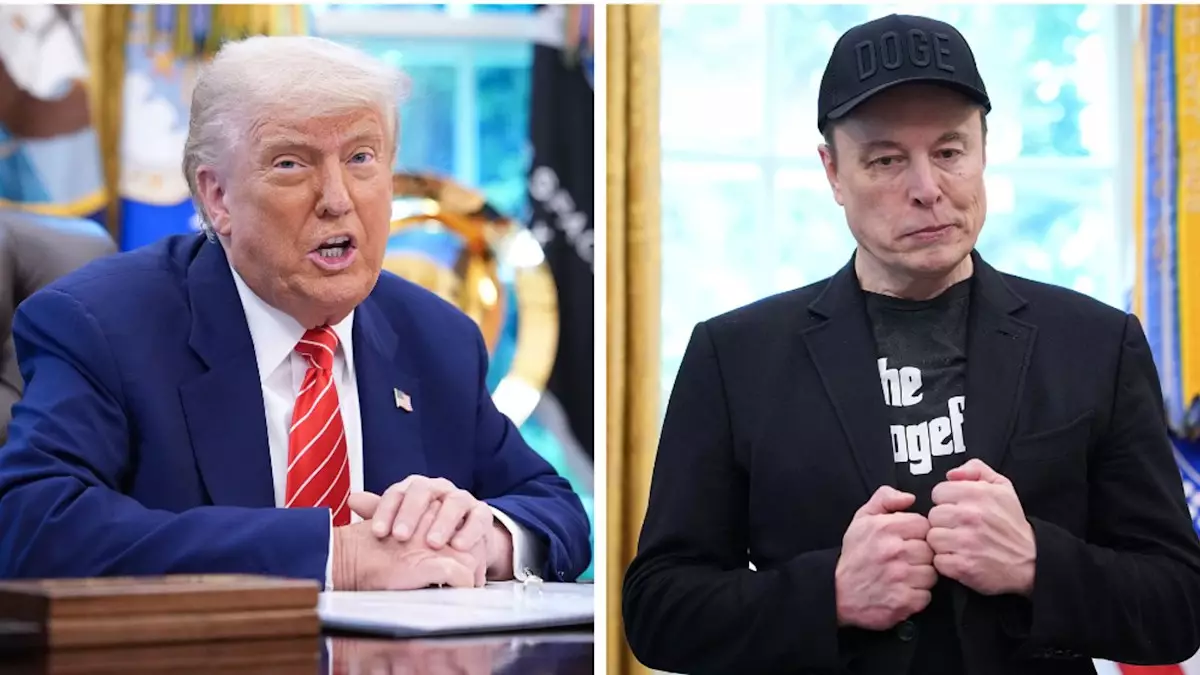In the unpredictable world of U.S. politics, few relationships have garnered as much attention as that between tech mogul Elon Musk and former President Donald Trump. Initially perceived as allies, their camaraderie seemed to embody a new era of political alliance infused with technological ambition. However, the dissolution of their relationship starkly reveals the fragility of such partnerships when ideological differences come into play. What was once a powerful collaboration has devolved into a public spat, raising questions about loyalty and the complex motivations that drive their respective actions.
Musk’s support for Trump marked an unexpected but noticeable shift in the billionaire’s political engagement. Historically, the South African-born entrepreneur had ties to the Democratic Party, often critiquing Republican agendas. However, after a harrowing assassination attempt on Trump, Musk’s public endorsement demonstrated a dramatic pivot. His willingness to not just align himself with Trump but to actively support his campaign with millions of dollars signified a calculated move, positioning him as a key player in a politically charged landscape. Musk’s foray into politics through his role as head of the Department of Government Efficiency (DOGE) seemed to solidify their connection further, highlighting how intertwined interests can influence political dynamics.
Ideological Fractures: The Breaking Point
The previously thriving alliance began to falter when Musk publicly criticized Trump’s One Big Beautiful Bill Act—a policy aimed at sweeping tax cuts and changes to numerous social programs. Musk’s outspoken assessment of the bill as a potential catalyst for exorbitant national debt indicated that for all their superficial similarities, fundamental ideological differences were beginning to emerge. The situation escalated when Trump, feeling the strain of Musk’s dissent, threatened to revoke government contracts with Tesla and SpaceX, ultimately marking a turning point in their relationship. This friction illuminates a crucial reality: that alliances in the political sphere can be as contingent as the policies they support.
Musk’s criticism of Trump’s legislation was not merely a routine political disagreement; it was a bold declaration of autonomy from a former ally. The statement, which Musk dubbed “crushingly unsustainable debt,” encapsulated his growing unease with Trump’s economic vision. This moment not only underscored Musk’s conflicting values but also exposed the precarious balance of power that can easily tip when personal interests outweigh political affiliations.
Personal Attacks and Public Scrutiny
As the fallout continued, the public confrontation intensified on social media, where both figures wield their platforms with as much ferocity as they navigate their scorn for each other. Trump’s characterization of Musk as “crazy” was more than a mere insult; it highlighted how quickly former allies can devolve into rivals, particularly when personal ambitions intersect with political aspirations. The former president’s outbursts on Truth Social further exemplified how political rhetoric can devolve into personal attacks, an unfortunate hallmark of modern political discourse.
In stark contrast, Musk retaliated not only defending his contributions to Trump’s campaign but also agreeing with sentiments calling for Trump’s impeachment. Such statements signal a remarkable shift from Musk’s previous endorsements; they reveal a deeper discontent that transcends their initial political partnership. The emergence of Musk’s commentary insinuates a more profound philosophical reflection on the part of the tech billionaire, who now appears to be embracing a more independent narrative.
Echoes of Controversy: Epstein Ties Resurface
The animosity reached new heights when Musk accused Trump of having a longstanding friendship with Jeffrey Epstein, a figure who looms large in public and political consciousness alike due to his infamous criminal history. This allegation served as a potential weapon in Musk’s arsenal, strategically designed to tarnish Trump’s reputation further. The introduction of Epstein into their dispute added layers of complexity, casting a shadow over not only Trump’s legacy but also Musk’s motivations for re-engagement in this very public dispute.
Ultimately, the unraveling of Musk and Trump’s relationship exemplifies a larger narrative about the mercurial nature of political alliances. As both men navigate their identities in the interconnected spheres of technology and politics, their divergence serves as a cautionary tale about the risks inherent in engaging with such volatile partnerships. What began as an unprecedented alliance between two powerful figures, once marked by mutual support and financial backing, has fast-tracked into a contentious battle that reflects deeper ideological rifts and personal grievances in the ever-evolving landscape of American politics.
